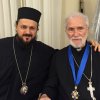Mirjana Jokovic was born in Belgrade, Yugoslavia. She spent her early years in Zambia, where her father was an industrial engineer.
.She was graduated from the Academy of Dramatic Arts in Belgrade and began to perform at the National Theater and the Yugoslav Drama Theater in Belgrade and in films and television. She was a regular character in the popular Yugoslav television series "Grey Home", and in 1988 she was named Best Leading Actress at the Rio de Janeiro Film Festival and Best International Actress at the San Sebastian Film Festival in Spain.
In 1989, she played the lead in the German film "Serbian Girl" directed by Peter Sehr, then she starred with Daniel Day Lewis in "Eversmile, New Jersey" directed by Carlos Sorin and won best actress for San Sebastián International Film Festival. In 1993 she moved to the United States, but she continued to make films in Serbia. She starred in "Vukovar" (1994) which earned her the Yugoslav Best Actress Award. In 1995 she played the female lead in the film "Underground", directed by Emir Kusturica, which won the Palme d'Or for best film at the Cannes Film Festival in 1995 and the New York Critics Circle Award for best foreign film. She also made "Three Summer Days" (1997), for which she received another Yugoslav Best Actress Award, and Cabaret Balkan, which won a Special Venice Film Festival Award in 1999.
She moved to the United States in 1993 and began a new career in American theater, appearing in the off-Broadway production of "Mud, River Stone" by Lynn Nottage at the Playwrights Horizon Theater. She also appeared in the chorus and as Chrsitothemys in the Broadway production of "Electra" directed by David Leveaux.
From 1997 through 2001 she worked at the American Repertory Theater in Cambridge, Massachusetts. Her roles at ART included Dulle Griet in "Full Circle" by Chuck Mee, Hermione in Shakespeare's "Winter's Tale", Desdemona in "Othello", the part of Natasha/Olga Knipper in "Three Farces and a Funeral" by Robert Brustein, and "Mother Courage and Her Children" by Bertolt Brecht.
In 2003 she played in "Romeo and Juliet", directed by Emily Mann, at the McCarter Theater and made the film "A Better Way to Die" directed by Scott Wiper for HBO. She also starred Off-Broadway in "Necessary Targets" by Eve Ensler, "Electra" by Sophocles at the Hartford Stage, and "Three Sisters" by Anton Chekhov at the American Conservatory Theater in San Francisco.
After her starring role in "Underground", she appeared in several European and American films. She played the part of Elena Iscovescu in "Side Streets", (CargoFilms/nuMedien) in 1998; the part of Adrijana, in "Strsljen" (also known as The Hornet, Le frelon, and Grenxa) (Cinema Design Belgrade) in 1998; the part of Ana in "Bure baruta" (also known as Cabaret Balkan, The Powder Keg, and Baril de poudre) (Paramount Pictures) in 1998; the part of a hotel maid in "Maid in Manhattan" (Columbia Pictures) in 2002; and as Tess in "Private Property" (Chiaroscuro Pictures) in 2002.
In 200- she began to teach in the Theater Faculty at the California Institute of the Arts in Valencia, California.
In April 2010 she helped organize the first theater workshop via Internet between CalArts and the Moscow Art Theater School in Moscow, under the auspices of the Binational Presidential Commission created by President Barack Obama and Russian President Dmitri Medvedev. In June 2010 she was invited to come to Moscow by the U.S. Embassy as the first Binational Presidential Commission cultural envoy to stimulate new exchanges with Moscow theaters and theater schools.





